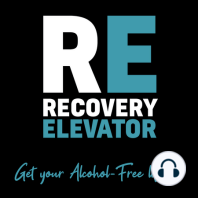47 min listen
RE 283: What do you do with a Problem?
ratings:
Length:
53 minutes
Released:
Jul 20, 2020
Format:
Podcast episode
Description
Heidi took her last drink on May 20, 2020. With 19 days (at the time of recording) this is her story of living alcohol-free (AF). Odette opens today welcoming normal drinkers. It has come to her attention that there are some listeners that are tuning in for educational purposes as a loved one has a problem with alcohol. Question for you normal drinkers: would you be interested in a Café RE group focused on you? Email Odette if you're interested. One of the most important books in Odette’s life is The Language of Letting Go by Melody Beattie. It was referred to her when her father first went into rehab. Each day is a new passage to read and often she is overcome with the meaning and finds herself wanting to share the meditation for the day with others. While she’s not going to read from this book today, Odette is sharing with you all…. Storytime with Odette! What Do You Do With a Problem? By Kobi Yamada [8:13] Odette introduces Heidi. Heidi is 28 years old and originally from San Diego, but she’s lived all over. Right now she’s in Orange County, CA with her new husband. She works in career services with a focus on health and behavioral sciences. She’s an adjunct teacher and a CrossFit coach and group fitness leader. Heidi loves the outdoors and seeing live music, plays, and time with family and friends. [14:05] Can you give listeners a background on your drinking? Heidi’s first time really drinking was around the age of 16 / her junior year of high school. At the same time, she was a good student and took her studying and athletics very seriously. She only drank on weekends. In college she continued to be a good student and athlete while drinking, so she never felt that what she was doing should be questioned. At the end of her college career, she mentioned to a coach that she felt she might have a drinking problem. This coach dismissed her concerns because she “doing fine.” [19:20] When you expressed concerns to your coach and he was dismissive, did you doubt him a little? Heidi said internally she knew that her drinking was a problem, but at the same time, he gave her a free pass to keep drinking. [17:16] Walk us through the last year or so of your drinking and what led up to your sober date? Heidi grew up with obsessive-compulsive tendencies, specifically manifesting in self-harm. When alcohol became an option, it quieted the self-harm aspect. Once Heidi moved back to the West Coast and started working full time, she fell into a routine of grabbing some alcohol on the way home from work. A few glasses of wine became a bottle of wine became a few bottles of wine, then turned to liquor. She started a new job and it turned out to be miserable, so drinking in the evenings was what got her through the days. She and her husband were true drinking partners, so they fed off each other as well. Last summer she noticed relationships with family members and her husband began to crumble and then she began to take a serious look at her drinking. One of the changes she made was signing up for the Recovery Elevator Ditch the Booze course. The accountability provided was what she needed. [33:49] Tell us about your experience with the Ditching The Booze course and the extra level of accountability. Heidi craves connection and doesn’t find it overwhelming. Some people in her group check-in daily, some every few days, but the common denominator is everyone has the same struggle. So, everyone already understands. At a moment’s notice, she can give support and get support from the community. [38:17] How has your family dynamic changed in these last 20 days? Heidi said that due to the current pandemic there have been fewer social pressures to go out. At home, with her husband, there has been greater levels of connection. She did have a fear that all they had was drinking and that was why they were together. They began to open up and have new and genuine conversations about themselves. She’s having more moments of
Released:
Jul 20, 2020
Format:
Podcast episode
Titles in the series (100)
005: You've got to be kidding me, he's an alcoholic also?: When I found out one of my brother's best friends is an alcoholic I was blown away; an a little upset that we hadn't connected years before so we could have been working together. Here are some of the resources that Elliot likes. Joe and... by Recovery Elevator ?
